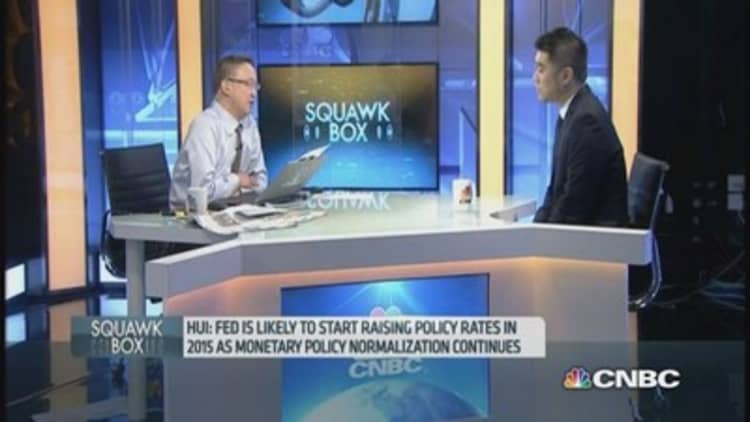After suffering through some extreme market swings over the past two years, some analysts believe Asia's economies are headed for a relatively boring new year.
"There is no great risk here, even including China," Bhaskar Laxminarayan, chief investment officer for Asia at Pictet Wealth Management, said last week. "It's flat-lined a bit, but it's flat-lined at about 3.5-4 percent [economic growth]. Right from China all the way to Singapore to Taiwan to Korea, we're doing okay," he said.
The region is fully employed and although wage growth has slowed, it hasn't collapsed, he said.
Read More What matters for markets next year: Goldman Sachs
That marks a big change from 2013 and much of 2014 when assets in emerging markets, including parts of Asia, convulsed after the U.S. Federal Reserve first broached its plan to begin tapering its asset purchases in May of last year. That spurred fund outflows amid concerns liquidity would take a hit, weighing on countries with current account deficits.
The selloff saw $14.1 billion exit emerging market equity funds, while $14.04 billion said good-bye to the segment's bond funds in 2013, according to data from Barclays. So far this year, around $2.53 billion has flowed out of emerging market equity funds, although the segment's bond funds have seen net inflows of around $2.58 billion, according to data from Jefferies. Asia-Pacific equity funds have seen around $74 billion in inflows this year, the data show.
Benign macro outlook
Others are also citing a benign macro outlook for Asia in the coming year.
"It's like a Goldilocks situation," Cecilia Chan, chief investment officer for fixed income in Asia at HSBC, said in an exclusive interview. "You've got growth [and] low inflation. It's a nice situation to be in."
Read More Beware: A poisoned stock market in 2015
Indeed, the worries on Asia's outlook might look like a hill of beans relative to other regions, such as Europe.

"What we worry about in Asia is whether China will maintain its growth at 7.5 percent or whether it will slow down to 7.0 percent. Still we are talking about 7 percent," she noted.
If the relative lack of economic worries translates into earnings, it will be positive for the region's risky assets, she said.
Emerging market risks?
To be sure, some disagree.
"There's a lot of risk in all the Asian economies," said Jalil Rasheed, investment director at Invesco, citing factors including Vietnam's need to reform its banks and political tensions in Thailand. He also noted that most countries in the region are still emerging markets.
"When there's one emerging market country that's not in favor anymore, it does affect all the emerging market countries," Rasheed said, noting that investment habits can be "seasonal" and when the theme is out of fashion, the selloff can be broad.
Rasheed is also concerned that the valuations in Asia markets.
Read MoreWhen time isn't money: The concerning trend that could rule 2015
"There's been so much capital into Asia over the last few years it's sent valuations up to a level that's unseen and unprecedented," he said.
Where previously a Europe-listed multi-national company would trade at a "late teens" price-to-earnings ratio and its Asian-listed subsidiary would be at single-digits, now the Asian subsidiary often trades at around 35 times earnings, with the mother company at 12-13 times, he said.
"Risk awareness of Asia hasn't gone away. It's just that Europe is a bit more high profile," Simon England-Brammer, head of institutional investment for Southeast Asia at Invesco, said.
—By CNBC.Com's Leslie Shaffer; Follow her on Twitter @LeslieShaffer1


